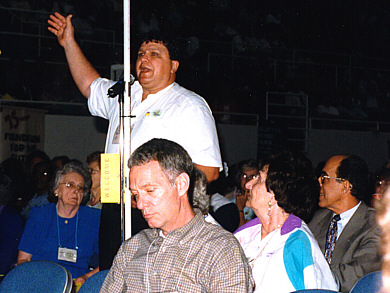General Board of Global
Ministries
![]()
UM Information
![]()
UM Reporter
![]()
![]()
Favorite Places
![]()
![]() Florida Southern College
Florida Southern College
![]()
![]() Bethune Cookman College
Bethune Cookman College
![]()
![]() FL
UM Children's Home
FL
UM Children's Home
![]()
|
|
Delegates debate, vote on 18 resolutions |
|
Photo by Geoff Anderson |
Debate on 18 resolutions voted on at the Dare to Share Jesus 1999 Florida Annual Conference Event was heated at times as laity and clergy delegates argued what the United Methoidst Church's stance should be on issues including abortion, gambling, the enviroment and homosexuality. |
By Michael Wacht LAKELAND — Should the United Methodist Church advertise on television? Should it take action addressing suicide among homosexual teens? Should all conference-sponsored events provide for complete participation by hearing-impaired persons? Those were just a few of the issues delegates addressed at the Dare to Share Jesus 1999 Florida Annual Conference Event June 1-5. A total of 18 resolutions were presented for consideration and vote. Several generated significant debate. One of the mostly intensely discussed resolutions that did not pass asked churches to stop gay teenage suicide. Presented by a group of 18 laity and clergy, the resolution cited statistics about high rates of gay teens dropping out of school, running away and committing suicide and the increase of anti-gay violence. It called for churches to become "safe havens of intentional love," offering support and education to gay and lesbian teens and their families. Terry Dewis, a sponsor of the resolution, said the education and protection referred to in the resolution were intended for all youth and particularly gay youth. She said the resolution was a "cry for help from gay children" and asked churches to "open our doors a little wider and offer support" to gay teens. The Rev. Al McGowen spoke against it, saying the resolution "eliminates the possibility of homosexual teens being liberated from this sin bondage." Brian Baggs II, the Melbourne District’s youth delegate, was also against the resolution because it did not address suicide among all teens. "If 33 percent of teen suicides were white, would we help only white teens?" Baggs asked resolution sponsors. The issue of same-sex unions was addressed during discussion on a resolution calling for clergy to be held accountable. Citing a "problem of Christian accountability within the United Methodist Church organization" and "a few church leaders who have acted outside the law of the Church" by conducting same-sex unions, the resolution called for the Council of Bishops to more strictly enforce the Book of Discipline. Roy Bowen from Lakewood United Methodist Church, Jacksonville, said "this problem is literally tearing our church apart." "Our problem is with the 1 percent of United Methodist ministers throughout the United States who have chosen not to follow the Discipline and the word of God," he said, adding that he wanted not only those who celebrate same-sex unions to be held accountable, but those who advocate worship of the goddess Sophia, deny the deity of Jesus Christ and are pro-choice on abortion. The Rev. John Powers of First United Methodist Church, Oviedo, spoke against the resolution, saying it "villainizes the people taking a stand of conscience…who are like Paul, who stood against the Discipline of his day." Russell Victor, a lay delegate from Jacksonville, said that people sometimes find themselves in "ministries that are very unclear" and that the resolution "could start a witch hunt." Bishop Cornelius Henderson called for a head count to be "absolutely sure" of the vote. The resolution passed by a count of 750-356. A resolution on revising Charles Wesley’s hymns also generated discussion. It addressed the "lack of theological depth in certain contemporary hymns and praise choruses" by putting the vast collection of poems and hymns written by John and Charles Wesley into more contemporary lyrical and musical settings. It asked the conference’s Discipleship and Communications teams to encourage musicians to recast Wesleyan hymns into "contemporary musical forms" and provide opportunities for musicians to showcase their work and share ideas. Winnie Ingram, a lay delegate from First United Methodist Church, St. Augustine, said she was against the resolution because she loved the old hymns and believed there was nothing wrong with the words or the music. Dorothy Preston, a lay delegate from the Jacksonville District, said, "Let them [contemporary worshippers] make their own hymns and leave Charles Wesley’s hymns alone." Despite the opposition, the resolution passed. Other resolutions that passed:
Resolutions that failed:
A resolution calling for use of chlorine-free products to reduce the creation of dioxin was ruled out of order because it called for an expenditure without addressing the source of the funds. Tampa District Superintendent David Brazelton made a motion Saturday that all churches and conference organizations "seek and purchase paper products which have not been processed with chlorine" and ask their vendors to obtain chlorine-free paper. The motion passed. Top
of this page |

